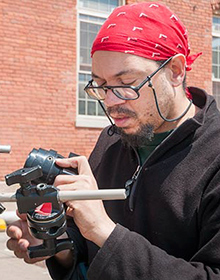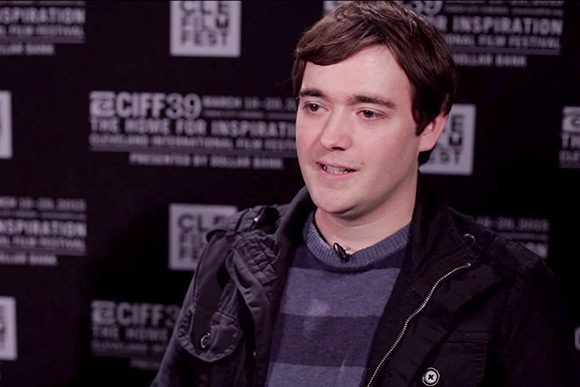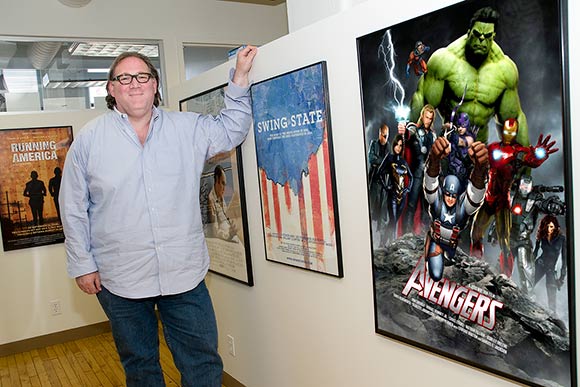Three local artists building a year-round film industry
Cleveland has played a starring role in several major films in recent years, and Ohio’s $20 million tax incentive has resulted in a $300 million economic impact in Northeast Ohio, according to the Greater Cleveland Film Commission.
Yet while these films have created valuable jobs for crew members and opportunities for filmmakers to work, it's safe to say that local filmmaking is still in a nascent stage. Would-be filmmakers face obstacles in getting films made and making film their primary occupation.
Despite these challenges, however, Dustin Lee (Super Pimp and Mind over Matters), Rob Lucas (Stella Wish), Sean Lackey (The Yank), and Tyler Davidson (Shelter from the Storm and Kings of Summer) are amongst the growing list of Cleveland filmmakers making their mark in this industry.
Paul Sloop, the Cleveland International Film Festival's Shorts Programmer, has seen an increase in the number and talent of short films shot in Ohio over the past couple of years. Two years ago, there was only one program of featured Ohio short films, yet the lineup increased to three programs in 2015.
"Once the last line of Tara Lynn Orr's short film, "Bis Gleich" was delivered, it was impossible not to tear up," Sloop says of the winner of both the juror and audience award.
Ivan Schwarz, President of the Greater Cleveland Film Commission, says the organization’s efforts are about one thing: "To put people to work and create an industry. It's not about any movie stars in our town, it's about jobs. We have the potential to deliver the same kind of service as L.A., but we need to make ourselves just as competitive."
Plenty of challenges remain. To be effective, Schwarz argues, Cleveland vitally needs a sound stage, a place within a movie studio providing appropriate acoustics to record dialogue.
Still, the growing filmmaking industry here in Cleveland continues to incubate promising local talent. Funding for locally made films and steady occupations for independent filmmakers could perhaps entice artists to stay here. It all begins with on-the-set training, Schwarz says: "There is nothing more valuable than participating on a film set and learning from the people who do it."
 Robert BanksOut of the shadows: Robert Banks
Robert BanksOut of the shadows: Robert Banks
In a classroom full of vintage film equipment, costumes and mannequins, Robert Banks shows footage of his newest film, Paper Shadows. It begins with a young woman in bare feet compulsively drawing with charcoal, taking the viewer on a mysterious journey from the very start.
"I've created Paper Shadows in black and white with old school equipment," Banks explains. “The last thing I want to do here is make another genre film."
Since Banks’ days as a young filmmaker who borrowed his father's equipment, he has avidly pursued this art form on his own. Yet he’s also received formal training in the art of lighting in photography and film. The bulk of his income as a local filmmaker comes from teaching, which he sees as a way of passing on his knowledge to other would-be filmmakers.
"When I see good lighting, it's better than sex," Banks says enthusiastically. "I hope I can teach others to be just as passionate about beautiful lighting, and the importance of it."
Although Paper Shadows is now on its way to becoming Banks’ latest successful independent film, it has come with its own set of obstacles and frustrations. "In Cleveland, filmmaking seems to be more of a hobby, and this won't result in quality films,” he comments. “People may watch movies, but they don't know movies. There needs to be a strong desire for cinema to get desirable results."
Because filmmaking in Cleveland is not yet viewed as a profession by many people, it can be difficult to get actors and actresses to commit to finishing a project. "Being an actress here kind of sucks sometimes," says local actress Kelly Imbrogno, who plays one of the lead roles in Paper Shadows. "Sometimes projects don't get finished if filmmaking isn't seen as a job, but not in this case. You have to try hard to make a good film, and Robert is committed."
 Tiffany LauferReturning to her roots: Tiffany Laufer
Tiffany LauferReturning to her roots: Tiffany Laufer
Tiffany Laufer has experimented with photography since childhood and went on to earn her B.A. in Studio Art from Georgetown University. Yet it wasn’t until taking film work-study classes in Rockport, Maine that she found her true passion – creating and directing films.
"I knew I wanted to be a writer like my grandmother was. She taught me to read and was a published author," Laufer says. "And I knew I could do it, too."
Amongst her most successful work is The Acorn Penny, which won a first place award in the Twin Rivers Media Festival in 2010, as well as theatrically-released film Christmas at Maxwell’s and the short film Honor Roll. Laufer teaches art and film at high schools, colleges and day camps, and also offers a workshop focused on lighting for adults.
"I've found a great playground here," Laufer says of her hometown. "I found it easy to find a great team to work with."
When Laufer returned to Cleveland after attending the American Film Institute Conservatory in L.A., she found herself absorbed in a welcoming atmosphere, opportunities to support herself as a teacher, and support for artists of all kinds, especially those creating documentaries. Due to Cleveland's thriving theater scene, there are always actors, actresses and crew looking to participate in projects.
Laufer agrees that the next decade of success depends on maintaining our tax incentive and building a sound stage. "You come back to your roots to tell the stories you want to tell," she says. "The Midwest holds so many stories of hardworking people doing extraordinary things, whether it is in the city or a small town."
 Daniel WingenfeldPutting the pieces together: Daniel Wingenfeld
Daniel WingenfeldPutting the pieces together: Daniel Wingenfeld
Native Clevelander Daniel Wingenfeld has experienced both the challenges and advantages of our city's filmmaking industry. After developing an early love of movies and studying film at The Ohio State University, he had valuable opportunities to work as a production assistant on the sets of The Avengers, Fun Size and Captain America 2.
When he is not working as a PA or creating a film, Wingenfeld works at the House of Blues and various farmers markets to make ends meet. Like other filmmakers, he knows how hard it is to land a full time job in film.
Yet he also knows that Cleveland can serve as a competitive location for local and national filmmakers to shoot, thanks in part to assets like Lake Erie and our big-city architecture, creating opportunities. "Producers may be thinking, 'Why shoot in NYC or DC when I can film in Cleveland for a fraction of the cost?’”
Although the majority of Cleveland filmmakers use Kickstarter and the like to crowd fund films, Wingenfeld created his short film “Shrimp and Ollie” using volunteers as actors. He paid his crew in Chipotle dinners and gas money, and did not need to rent any equipment.
His debut short film turned out to be a great success at CIFF, filling up two theatres on two separate screens when it was shown alongside seven other Ohio-made short films. “This shows us the willingness of local artists and actors to pull together as a team to complete a project, even on a volunteer basis,” he says.
Resources for local filmmakers
Although Cleveland's filmmaking industry may still be in development, there are a growing number of resources available to help local filmmakers get started. First, it should be said that technological advances have already helped defray the costs of filmmaking, lowering the barrier to entry. Olive by Hooman Khalili was the first film shot entirely on a Nokia N8 smart phone in 2011, and was shown in theatres in L.A. Projects can now be advertised and viewed on Youtube.
Locally, there are educational and networking opportunities that can help amateur filmmakers break into the local scene. Cuyahoga Community College offers annual Motion Picture Training Workshops that prepare individuals for entry-level production positions. The workshops focus on lighting, budgeting, scheduling, editing and stunt work. Tri-C also offers a Film Crew Training Program that was partially developed by the Greater Cleveland Film Commission and gives participants hands-on experience on actual sets with filmmakers.
Local filmmakers have benefited from being able to use Kickstarter to raise funds and searching Craigslist for actors and crew. Additionally, the Greater Cleveland Film Commission has developed a Production Directory. Filmmakers can search for crew listings and hospitality services to assist them in their next successful project.












